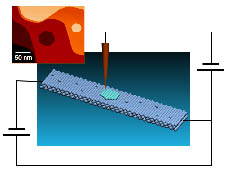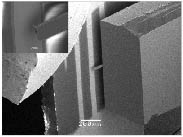The University of Maryland MRSEC grants ended in September 2013 after 17 years of successful operation. This site remains as a history of the center, but will not be actively maintained.
IRG 1: Low-Dimensional Interfaces


Senior Investigators
- William G. Cullen, Physics
- Theodore L. Einstein (leader), Physics
- Michael S. Fuhrer, Physics
- Raymond J. Phaneuf, Materials Science & Engineering
- Janice E. Reutt-Robey (leader), Chemistry & Biochemistry
- John D. Weeks, IPST
Seed-Funded Collaborator
- Dionisios Margetis, Mathematics
Research Goals
Controlling electronic transport and recombination at boundaries between different materials is the key to progress in a myriad of applications including device physics, nano-bio mimetics, energy harvesting and photonics. Revolutionary opportunities have opened in all of these areas through the use of nanoscale materials structures, with parallel new challenges resulting from the concomitant change in the ratio of surface and bulk properties. We directly access low-dimensional interfaces of nanostructures by fabricating layered materials and ultra-thin films with domain and interface boundaries accessible to scanned probe and electron microscopies. We combine the structural characterization of interfaces with in situ measurement of device properties by fabricating the materials of interest into model thin-film transistor stuctures.
The objective of this IRG is to optimize nanoscale interface structures for electron transport, and charge separation and recombination. To do so, we apply a full range of tools from theoretical modeling of interface structure based on fundamental interactions, to device preparation and characterization. Materials systems understudy include graphene, C60 and molecular organic semiconductors.
Highlights
- Electric Potential Metrology on the Nanoscale
- Bilayer Graphene Photon Detector
- Metal Atom-Directed Traffic: Building Efficient 3-D Materials
- For the complete list, see the Highlights page
Publications

Janice Reutt-Robey
Professor, Chemistry & Biochemistry

Ted Einstein
Professor, Physics
Contact Us | Page Last Updated: 06/18/12 | Site Map


